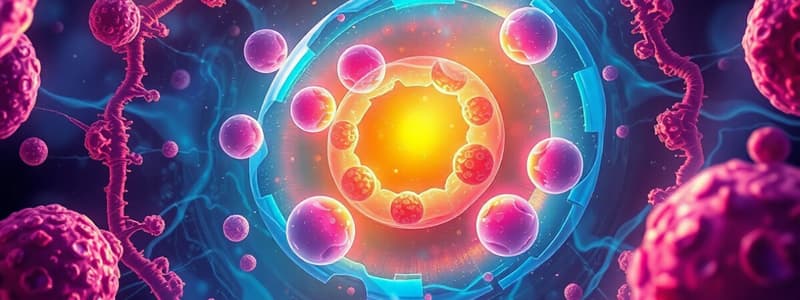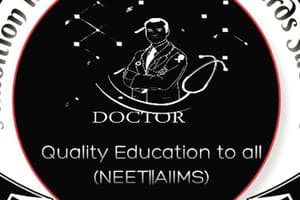Podcast
Questions and Answers
What is a key factor that limits cell size and necessitates the need for internal compartments?
What is a key factor that limits cell size and necessitates the need for internal compartments?
- Genetic material diversity
- Increased energy production
- Surface area to volume ratio (correct)
- Membrane permeability
During which phase of the cell cycle does DNA replication take place?
During which phase of the cell cycle does DNA replication take place?
- S phase (correct)
- G2 phase
- Prophase
- G1 phase
What distinguishes chloroplasts from mitochondria in plant cells?
What distinguishes chloroplasts from mitochondria in plant cells?
- Mitochondria contain DNA and ribosomes
- Chloroplasts perform photosynthesis (correct)
- Mitochondria are only found in plant cells
- Chloroplasts are involved in cellular respiration
What can result from a disruption in the regulation of the cell cycle and apoptosis?
What can result from a disruption in the regulation of the cell cycle and apoptosis?
Which statement accurately describes the function of stem cells?
Which statement accurately describes the function of stem cells?
What distinguishes a gene from an allele?
What distinguishes a gene from an allele?
Which of the following processes is crucial for genetic diversity during sexual reproduction?
Which of the following processes is crucial for genetic diversity during sexual reproduction?
In a monohybrid cross, what phenotypic ratio is typically expected in the offspring?
In a monohybrid cross, what phenotypic ratio is typically expected in the offspring?
What is a karyotype used for?
What is a karyotype used for?
Which of the following statements accurately reflects the concept of sex-linked inheritance?
Which of the following statements accurately reflects the concept of sex-linked inheritance?
What is the primary advantage of asexual reproduction compared to sexual reproduction?
What is the primary advantage of asexual reproduction compared to sexual reproduction?
How does environmental and epigenetic factors influence phenotypes?
How does environmental and epigenetic factors influence phenotypes?
What is a significant biological consequence of a decrease in genetic diversity within a population?
What is a significant biological consequence of a decrease in genetic diversity within a population?
Flashcards
Prokaryotic vs. Eukaryotic Cells
Prokaryotic vs. Eukaryotic Cells
Prokaryotic cells lack a nucleus and membrane-bound organelles, while eukaryotic cells have both.
Cell Size Limitations
Cell Size Limitations
Large cells have a small surface area to volume ratio, hindering nutrient intake and waste removal.
Mitosis Stages
Mitosis Stages
The five stages of cell division (Interphase, Prophase, Metaphase, Anaphase, Telophase) lead to cell duplication.
Apoptosis
Apoptosis
Signup and view all the flashcards
Stem Cell Properties
Stem Cell Properties
Signup and view all the flashcards
Gene
Gene
Signup and view all the flashcards
Allele
Allele
Signup and view all the flashcards
Genome
Genome
Signup and view all the flashcards
Homologous Chromosomes
Homologous Chromosomes
Signup and view all the flashcards
Meiosis
Meiosis
Signup and view all the flashcards
Sex Chromosome
Sex Chromosome
Signup and view all the flashcards
Karyotype
Karyotype
Signup and view all the flashcards
Monohybrid Cross
Monohybrid Cross
Signup and view all the flashcards
Study Notes
Key Knowledge Units 1 and 2
- Cells are the basic structural components of all life on Earth. Prokaryotic and eukaryotic cells are differentiated.
- Surface area-to-volume ratio limits cell size, necessitating internal compartments (organelles).
- Plant and animal cells have organelles with specific functions (e.g., chloroplasts, mitochondria).
- Plasma membranes control substance passage (water, hydrophilic/hydrophobic).
- Prokaryotes reproduce via binary fission. Eukaryotes reproduce through a complex cell cycle including mitosis and cytokinesis in plant and animal cells.
- Apoptosis is controlled cell death. Cell cycle disruption, or malfunctions in apoptosis, can lead to cancer.
- Stem cells specialize and renew tissues. Stem cells display pluripotency and totipotency.
- Plant cells specialize for functions like water intake and movement within vascular plants.
- Animal cells specialize in tissue, organ and systems like digestive, endocrine and excretory.
- Homeostasis in animals regulates water balance, body temperature and blood glucose, with specific examples including type 1 diabetes, hypoglycemia, and hyperthyroidism.
- Scientific methodology is applied to understanding life that includes classification, identification, fieldwork, modelling, product, process, and system development, or simulation. Data generation might be qualitative or quantitative. Data collection requires accuracy, precision, reproducibility and repeatability, along with validity.
- Primary data organization, analysis, and evaluation identifies significant patterns and relationships.
- Scientific reports precisely communicate findings. Abbreviations and standard representations are utilized.
- Genes, alleles, and genomes are fundamental genetic units.
- Homologous chromosomes carry the same gene loci. Autosomes and sex chromosomes are differentiated.
- Karyotypes show chromosomal variation and abnormalities visually.
- Meiosis produces haploid gametes with crossing over creating diversity.
- Dominant and recessive traits influence phenotypes, including codominance and incomplete dominance.
- Genetic material, environment, and epigenetics shape phenotypes. Pedigree charts and inheritance patterns (autosomal and sex-linked) demonstrate how traits are passed down.
- Predicting genetic outcomes from crosses (mono or dihybrid) is possible through using the tools of genetics.
- Asexual vs. Sexual reproduction has biological advantages and disadvantages.
- Reproductive cloning methods like embryo splitting and SCNT are utilized.
- Genetic diversity within species influences survival.
- Structural, physiological, and behavioral adaptations enhance survival in diverse environments and through interdependencies between species. Keystone species are especially significant to a species distribution and density within an ecosystem.
- Aboriginal and Torres Strait Islander knowledge contributes to understanding species adaptations.
Studying That Suits You
Use AI to generate personalized quizzes and flashcards to suit your learning preferences.





